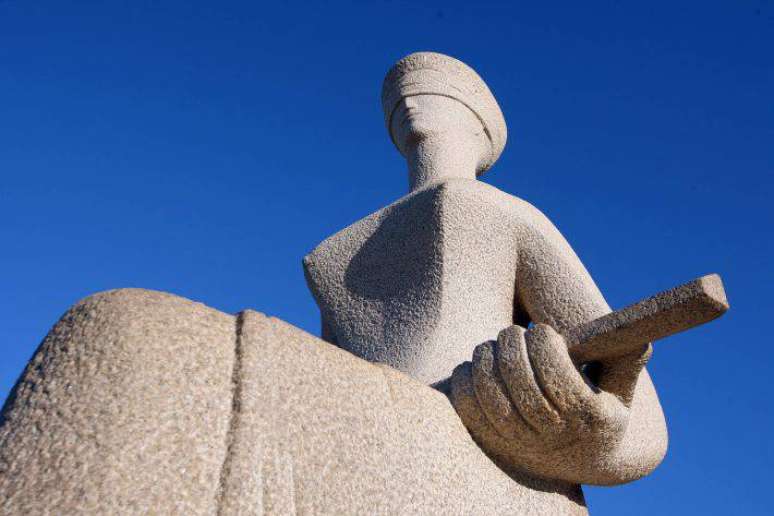In the Virtual Plenary, in the midst of the judicial break, six ministers voted to overturn the privilege of the Public Prosecutor guaranteed in the ‘Conselhão’ resolution, created 17 years ago; The text deals with maintaining ‘personal benefits’ for those who have held executive, management or consultancy positions at some point in their careers
The Federal Supreme Court started the work of the Virtual Plenary in the judicial recess by forming a majority to overturn a pendant of the Public Prosecutor – the so-called ‘fifth’, ‘tenth’ and ‘option’ paid to the members of the body. The terms refer to “personal benefits” afforded to those who held managerial, managerial or advisory positions at some point in their career and continued to receive those salaries even after leaving those positions.
The understanding of the STF ministers goes against the interests and appeals of the main prosecutorial bodies and also of the National Prosecutorial Council, the ‘Conselhão’. And it signals the unblocking of a discussion in the Federal Court of Auditors which could lead to an order for prosecutors and prosecutors to return values to the public coffers. But the class is already trying to fight back in the Supreme Court.
The action the Supreme Court is hearing during this 2023 judicial recess came to the High Court 17 years ago. It was signed by the Union’s Advocate General and President Luiz Inácio Lula da Silva at the end of his first term in December 2006. At the time, the AGU was led by Álvaro Augusto Ribeiro Costa.
At the heart of the action is a Council resolution issued in July of the same year. The disputed provision allowed older deputies to receive, in addition to the grants, values referring to managerial positions held by them at some stage of their career.
Currently, they can only receive the additional payment while in management, leadership or consulting positions. Previously, this added value was built into the paycheck – and this is the whole point of the action that drags into the STF.
The case was initially forwarded to the office of then Minister Joaquim Barbosa, in the middle of the year-end break – that 2006.
Subsequently, the trial – at the time only in physical version – went through a circuit of the Supreme Court until it reached the office of then-President Ellen Gracie. Due to the ‘relevance’ of the matter, the minister did not appreciate the preliminary injunction – maintaining the transfers pending a decision on the merits of the Court – and forwarded the case to the direct analysis of the Plenary.
The action, however, only began to be judged in November last year, 16 years after it was filed. The analysis was suspended on two occasions, at the request of ministers Luiz Fux and Dias Toffoli. Now, the trial will be on trial throughout the judicial interval.
The virtual session for analyzing the matter will end only after the Supreme Court resumes work in August. The end of the process is scheduled for the 7th of that month.
What are fifths, tenths and options?
The terms “fifth”, “tenth”, and “option” refer to personal benefits incorporated into the salaries of attorneys and prosecutors who have held executive, management or consulting positions.
This benefit is paid to members of parliament who met the requirements to receive it before December 1998 – the year of the administrative reform of the FHC government which ended with the incorporation of the pendant.
These benefits were called ‘fifths’ or ‘tenths’ due to the volume of resources incorporated into the salaries of members of the Public Prosecutor’s Office. For example, if a prosecutor held a senior position, he might have a “fifth” or a “tenth” – of an additional addition to his basic salary, after having held that function for a specified period.
The “option” is tied to members of the federal prosecutor. Before the creation of the Advocacia-Geral da União in 1993, the functions of the body were carried out by the members of the MPF. When the AGU was established, prosecutors had a choice: they migrated by career, to the Prosecutor’s Office, once and for all; or they have chosen to remain in the previous regime, i.e. remaining within the ambit of the Federal Public Prosecutor, but with the possibility of advocating cases not filed against the Union.
Unconstitutionality
The rapporteur of the case at the STF, Luís Roberto Barroso, defends that the Supreme Court declares the CNMP resolution unconstitutional – the text was modified in 2006, establishing that the ‘fifth’, the ‘tenth’ and the ‘option’ which had already been received by members of the MP could continue to be paid, apart from pay stubs. He also released an additional 20% payment for those who retired before 1998 at the last stage of their MP career.
In the Supreme Court, Lula and Álvaro Augusto Ribeiro Costa argued that the Council resolution violates the ‘republican principle’ which ‘imposes the prohibition of privileges’ and serves as a ‘north to characterize, as valid or not, any additions and bonuses to the single monthly installment of public officials’.
The Attorney General’s Office, whose holder also chairs the CNMP, has spoken out against the AGU’s action. At the time, it was argued that the provision would comply with the Constitution since “personal benefits” would be subjected, like subsidies, to the constitutional ceiling of functionalism: the salaries of the ministers of the STF.
Representative entities of the MP accompanied the demonstration of the PGR. In 2007, the National Association of Prosecutors, the National Association of Labor Prosecutors, the National Association of Military Prosecutors, and the Federal District and Territories Prosecutors’ Association argued that the incorporation of “personal should be recognized as an “entitlement” by prosecutors and prosecutors.
In analyzing the case, Barroso underlined that the Constitution forbids “the addition of any type of remuneration or personal advantage deriving from the regular exercise of the office”.
The placement was accompanied by ministers Edson Fachin, Luiz Fux, Alexandre de Moraes, Dias Toffoli and Cármen Lúcia.
Barroso’s vote proposes the affirmation of the following thesis. “The incorporation of personal advantages deriving from the past exercise of managerial, managerial or advisory duties, as well as the addition of 20% to the calculation of retirement income for those who retire at the last stage of their career, violate the regime of constitutional subsidy.”
return of values
The Supreme Court’s decision on the matter is awaited with great anticipation by the Public Prosecutor’s Office, not only for the last word on ‘personal advantages’, but also for a deployment of the matter before the Federal Court of Auditors.
In 2015, the Court of Auditors recognized ‘irregularities’ in the payment of the ‘fifths’ and established that the Public Prosecutor’s Office charged its members with any sums paid as ‘personal benefits’.
According to the ruling, the sums received by prosecutors in the last five years would be charged.
The class entities appealed and the matter returned to the TCU agenda in April. The Court of Auditors has suspended the determination on the return of the sums ‘wrongly received’, until further collegial discussion, after the sentence of the STF.
Counterattack
With the majority installed in the Stf to overturn the benefit, the prosecutor is already trying a behind-the-scenes backlash, particularly with a view to preventing the money from being returned.
The class associations must appeal to the supreme judge so that the ministers modulate the decision, i.e. set the date of conclusion of the trial as a ‘milestone’ – i.e. that prosecutors and prosecutors do not have to return the sums received during these years.
One of the main points raised in the counterattack scheme is the fact that the action has been pending for more than 16 years in the Supreme Court. The class wants that, in the event that the ‘scenes’ are definitively overturned – as the Supreme pointed out – they are cut from the sheet, but that the decision is not retroactive.
Source: Terra
Rose James is a Gossipify movie and series reviewer known for her in-depth analysis and unique perspective on the latest releases. With a background in film studies, she provides engaging and informative reviews, and keeps readers up to date with industry trends and emerging talents.







